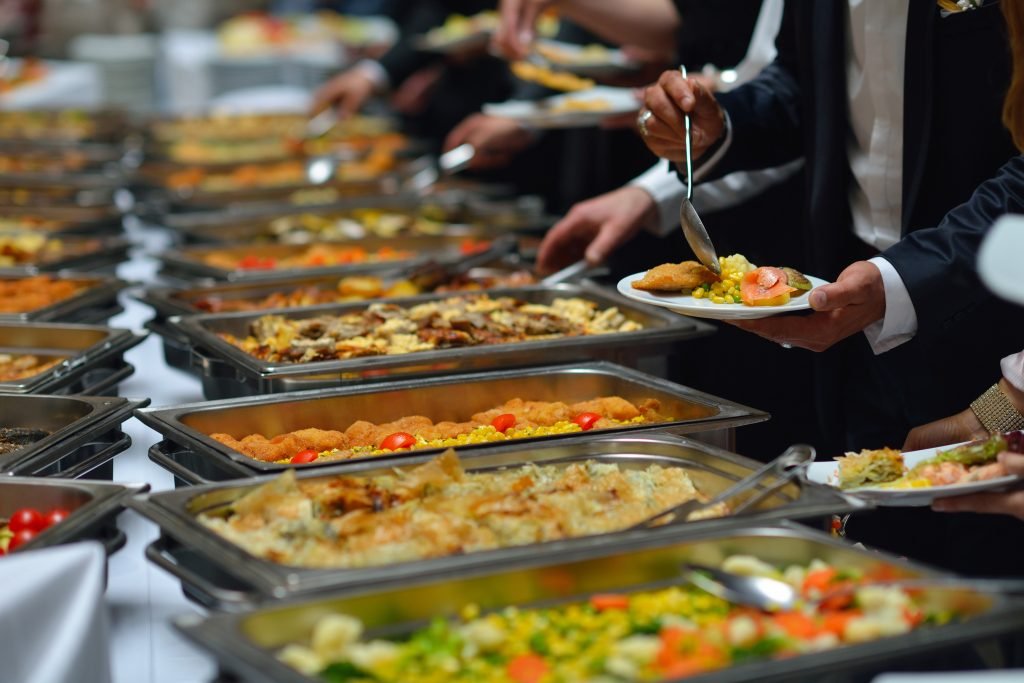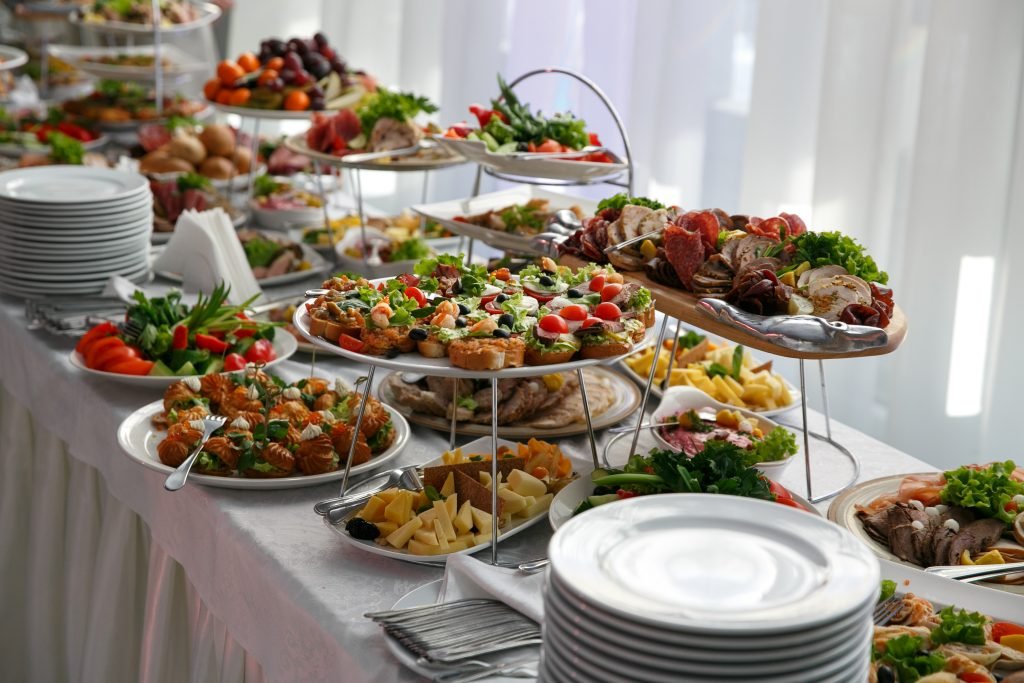Outdoor weddings offer a beautiful and memorable setting for your special day, but they also come with unique challenges, particularly when it comes to catering. From weather unpredictability to logistical concerns, there are several factors to keep in mind to ensure your outdoor wedding catering is seamless and successful. Here’s a comprehensive guide on special considerations for outdoor wedding catering:
1. Weather Preparedness
Weather Contingency Plans
- Tents and Shelters: Have tents or shelters on standby to protect against unexpected rain or harsh sun. Ensure they are large enough to cover dining areas, food stations, and guests.
- Heaters and Fans: Depending on the season, you may need portable heaters or fans to maintain a comfortable temperature for guests and food.
Monitoring the Forecast
- Keep a close eye on the weather forecast leading up to your wedding day. Be prepared to make last-minute adjustments if necessary.
2. Food Safety and Hygiene

Temperature Control
- Refrigeration: Ensure that cold foods are kept at safe temperatures. Use coolers, ice packs, and portable refrigerators to store perishable items.
- Heat Sources: Keep hot foods hot with chafing dishes, portable stoves, or heat lamps. Proper temperature control is crucial to prevent foodborne illnesses.
Sanitation Stations
- Set up handwashing stations and provide hand sanitizers for guests and Wedding catering staff. This is especially important in outdoor settings where access to running water may be limited.
3. Menu Selection
Seasonal and Weather-Appropriate Dishes
- Choose menu items that are suitable for the outdoor environment. For hot weather, opt for light, refreshing dishes and avoid heavy, cream-based foods that can spoil quickly.
- In cooler weather, consider hearty, warm dishes that will stay appetizing in the open air.
Portable and Easy-to-Serve Foods
- Select foods that are easy to transport, serve, and eat. Finger foods, pre-plated dishes, and individually wrapped items can simplify theWedding catering process.
4. Logistics and Equipment – Wedding Catering
Portable Kitchen Setup
- Ensure your caterer has the necessary equipment to set up a functional kitchen outdoors. This may include portable stoves, grills, ovens, and refrigeration units.
Electricity and Power Sources
- Verify the availability of electrical outlets at the venue. If none are available, you may need to rent generators to power kitchen equipment and lighting.
Water Supply
- Arrange for an adequate water supply for cooking, cleaning, and drinking. This may involve bringing in portable water tanks or coordinating with the venue for water access.
5. Venue-Specific Considerations

Accessibility and Terrain
- Assess the terrain and accessibility of the venue. Ensure that catering equipment and staff can easily access the site. Consider the impact of uneven ground or sandy surfaces on setup and service.
Permits and Regulations
- Check with local authorities for any required permits or regulations for outdoor Wedding catering. This might include health department permits or fire safety regulations for cooking equipment.
6. Pest Control
Insect Prevention
- Covers and Nets: Use covers and nets to protect food from insects. Mesh food covers can keep bugs away while allowing air circulation.
- Repellents: Provide natural insect repellents for guests and place citronella candles or torches around the dining area to deter mosquitoes and flies.
Waste Management
- Set up clearly marked trash and recycling bins to manage waste efficiently. Promptly remove garbage to prevent attracting pests.
7. Guest Comfort
Seating and Shade
- Ensure there is ample seating and shaded areas for guests to dine comfortably. Consider renting umbrellas, canopies, or setting up shaded lounge areas.
Hydration Stations
- Provide plenty of water and non-alcoholic beverages to keep guests hydrated, especially in warm weather.
Restroom Facilities
- Ensure there are sufficient restroom facilities. If the venue doesn’t provide them, consider renting portable restrooms and ensuring they are maintained throughout the event.
8. Communication with Vendors

Clear Instructions
- Provide detailed instructions and maps to vendors and caterers for accessing the outdoor venue. Clear communication helps prevent logistical issues on the wedding day.
Timeline Coordination
- Coordinate with your caterer to establish a clear timeline for setup, service, and breakdown. Outdoor settings can present unique challenges, so precise timing is crucial.
9. Sustainable Practices
Eco-Friendly Options
- Consider incorporating sustainable practices into your catering. Use biodegradable or reusable plates, cups, and utensils(Wedding Catering). Opt for locally sourced and organic ingredients to reduce the environmental impact.
Waste Reduction
- Plan portion sizes carefully to minimize food waste. Arrange for leftovers to be donated to local shelters or composted.
Conclusion
Catering for an outdoor wedding requires careful planning and consideration of several unique factors. By preparing for weather conditions, ensuring food safety, choosing appropriate menu items, and addressing logistical challenges, you can create a smooth and enjoyable dining experience for your guests. Thoughtful planning and clear communication with your caterer and vendors will help ensure that your outdoor wedding catering is a delicious and memorable success.


